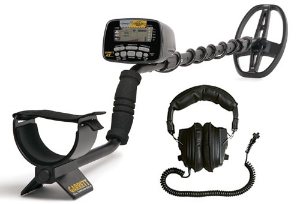Monday, November 03 2014
Detectorists often argue the merits of manual versus automatic ground balancing a VLF (very low frequency) metal detector. Both have their pros and cons. Automatic is easier for beginners or anyone who wants a "turn on and go" experience. Automatic can be especially beneficial where the ground mineralization varies a lot because the detector tracks the ground mineralization for you as you move along, instead of requiring constant fiddling with controls on a manual unit. The downside of automatic ground tracking is that it can track out very faint gold signals in an attempt to eliminate ground signals. Small gold or larger gold that is buried deep, might be tracked out.
In theory, a perfectly ground balanced detector that has zero response to the ground is desirable. However, most experts would suggest setting the control to where there is a slight increase in sound as the coil is lowered to the ground. This is called setting the ground balance "hot" or "positive." Doing so will enhance the signal from very small or very deep nuggets. If the detector becomes slightly ground balanced to the negative side, it acts to suppress faint signals. Ground balancing a bit positive insures this condition is less likely to occur. Comments:
|






 If you prefer a finer degree of control, manual ground balancing is achieved by raising and lowering the detector coil a few inches over the ground. The detector will sound off either as the coil approaches the ground or as it is raised away form the ground. The ground balance control is manipulated until there is no sound either raising or lowering the coil. The detector is now said to be ground balanced. (Always read your detector's Owners Manual, too, for instructions.)
If you prefer a finer degree of control, manual ground balancing is achieved by raising and lowering the detector coil a few inches over the ground. The detector will sound off either as the coil approaches the ground or as it is raised away form the ground. The ground balance control is manipulated until there is no sound either raising or lowering the coil. The detector is now said to be ground balanced. (Always read your detector's Owners Manual, too, for instructions.)